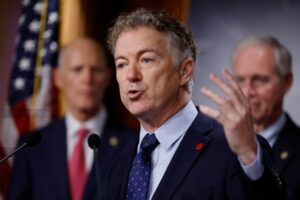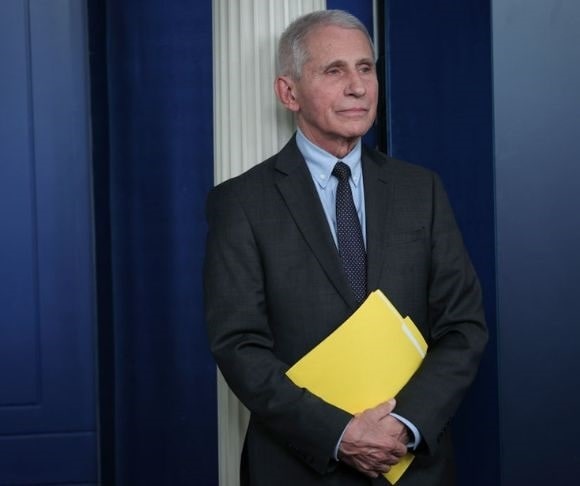Those who helped spearhead the colossal overreach of the coronavirus pandemic social curb regime are now attempting to soft-pedal it as a mere stumble on a well-intentioned path. Yet even as this pivot campaign goes into effect, traces of the same hubris that made it all possible cannot help coming to the fore.
“It was, perhaps, an impossible job. Make one man the face of public health amid an unprecedented pandemic, in a country as fractious as the United States, and there were bound to be disappointments and frustrations, and they were bound to get personal.” That’s how The New York Times begins an extensive feature article based on a series of interviews with Dr. Anthony Fauci, the former chief White House advisor and federal point man of the strongarmed effort to get Americans masked and vaxxed – on pain of loss of job and personal freedoms.
This would be the same New York Times that pompously labeled Fauci “America’s Doctor” as it granted him a platform in December to pen a self-congratulatory goodbye letter as he called it a career.
But “America’s Doctor” is coming under fire these days, as the heavy-handed establishment narrative on the pandemic continues to crumble. “At least 30 state legislatures have passed laws limiting public-health powers in pandemics,” The Times uncomfortably notes in its April 25 spin reboot. “This January, the month after Anthony Fauci retired as the four-decade head of the National Institute of Allergy and Infectious Diseases, barely half of Americans said they trusted the country’s public-health institutions to manage a future pandemic.”
Did Fauci go too far? The paper earnestly attempts to inform readers that that was never the intent.
‘Public-Health Establishment’ Made Some Boo-Boos
“Of course, there were mistakes and missteps, including some by Fauci,” The Times concedes. “And the broader public-health establishment that Fauci came to embody made other mistakes, too, even if it wasn’t always easy to know at the time or identify later who exactly was responsible. Almost certainly, schools stayed closed longer than they needed to.”
Mistakes, missteps, that’s all they were. And The Times wants you to know that you should be ashamed of yourself for blaming those who curtailed your liberty and threatened your livelihood.

Anthony Fauci (Photo by Win McNamee/Getty Images)
“But three years on, whether you are focused on Covid’s direct carnage or on its collateral damage, it seems irrational to pin the brutality of America’s pandemic on policy failures,” the paper scolds, “however much Americans want to put the blame somewhere. Or on someone.”
And we haven’t even gotten to the interview yet.
That is where all this repackaging comes a cropper. For Fauci is still Fauci, and he expressed to The Times the same imperious nature that so defined the lockdowns of US communities not so long ago.
“Right off the bat, we were dealing with a new type of vaccine, an mRNA vaccine. And there was this smoldering level of suspicion and that divisiveness in the country. And then there was the whole idea of people not getting vaccinated, and then came mandating,” Fauci states.
But then he adds something truly astonishing: “I think, almost paradoxically, you had people who were on the fence about getting vaccinated thinking, why are they forcing me to do this? And that sometimes-beautiful independent streak in our country becomes counterproductive. And you have that smoldering anti-science feeling, a divisiveness that’s palpable politically in this country.”
Just like that, Fauci reduces freedom of thought among Americans to nothing more than a stubborn habit that proved undesirable to his plans. This is the attitude that has inspired state legislatures across the country to rein in government public health officials.
Fauci on Shutdowns: I Didn’t Do It
He then effortlessly transitions from this haughty assertion to insisting that he never had anything to do with the closing of America. “But when people say, ‘Fauci shut down the economy’ – it wasn’t Fauci,” he exclaimed. “The [US Centers for Disease Control and Prevention] was the organization that made those recommendations. I happened to be perceived as the personification of the recommendations.
“But show me a school that I shut down and show me a factory that I shut down. Never. I never did. I gave a public-health recommendation that echoed the C.D.C.’s recommendation, and people made a decision based on that. But I never criticized the people who had to make the decisions one way or the other.”

Rand Paul (Photo by Chip Somodevilla/Getty Images)
Sen. Rand Paul (R-KY), who has been a constant thorn in Fauci’s side, explained how duplicitous a denial this is. “This is a hysteria, and it comes from the top down, and Fauci was essentially the top dog in town,” Paul told Fox News, referring to the climate of fear created by Fauci during the pandemic. “Wear a mask, one mask, two mask, cloth masks – he was giving the information that natural immunity didn’t make any sense,” Paul stressed. “Dr. Fauci discounted natural immunity… and then we went overboard and closed the schools with no evidence of children getting sick or dying.”
“His edicts did have the force of a mandate,” Paul continued. “Democrat governors largely throughout the United States followed them, the schools followed them.”
As The Times’ interview rolls on, Fauci complains that the fact that he was scientifically wrong on several notable occasions, such as about “herd immunity” being reached via COVID vaccines, “has been weaponized against me” and that criticism of his flawed messaging throughout the pandemic amounts to “playing a lot of Monday-morning quarterbacking.”
It’s hard to see how such clichés will be enough to get the American people to shrug and move on from the pain inflicted upon them by a government-authorized social control regimen that affected their health, freedom and economic solvency. But that won’t keep the dominant establishment spin machine from trying.




